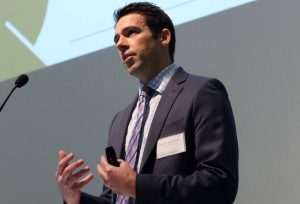RBWH on the frontline in the war against superbugs

Director Jason Roberts, a UQ School of Medicine and School of Pharmacy Professor and a Consultant Clinical Pharmacist at the RBWH, at the official launch of CRE REDUCE at the RBWH. The centre is funded by a $2.1 million National Health and Medical Research Council grant.
The Royal Brisbane and Women’s Hospital has joined an international effort to slow the emergence of superbugs.
Launched at RBWH in July, the University of Queensland’s Centre of Research Excellence for REdefining antimicrobial use to reDUce resistanCE (CRE REDUCE) is tackling the global problem head on.
The RBWH has become a key battleground in the war with Australia’s leading national and international experts converging on the hospital’s world-class research facilities.
Director Jason Roberts said CRE REDUCE brings top researchers and clinicians from more than 20 countries together to accelerate research output and fast-track transformative discoveries in antibiotic resistance.
“Our research aims to slow this dire trajectory and buy more time for researchers developing new antimicrobials, a process which takes at least 13 years,” he said.
CRE REDUCE is applying a multi-pronged attack to gain ground on drug resistant superbugs, which includes antibiotic development, redefining antibiotic use and community engagement.
“We’ll also be working to develop international capacity by fostering post-graduate and post-doctoral fellow research,” Professor Roberts said.
The World Health Organization has identified antimicrobial resistance as one of the greatest worldwide threats to public health.
Professor Roberts said it is estimated that 10 million deaths a year will be caused by antimicrobial resistant superbugs by 2050, compared to 8.2 million from cancer.
“The situation is urgent – increasingly we are seeing patients infected with bacteria that are resistant to all our antimicrobials,” he said.
“It is essential that experts in basic, clinical and translational science collaborate to generate new approaches to treating patients, which can then be shared with doctors around the world as soon as possible.”
